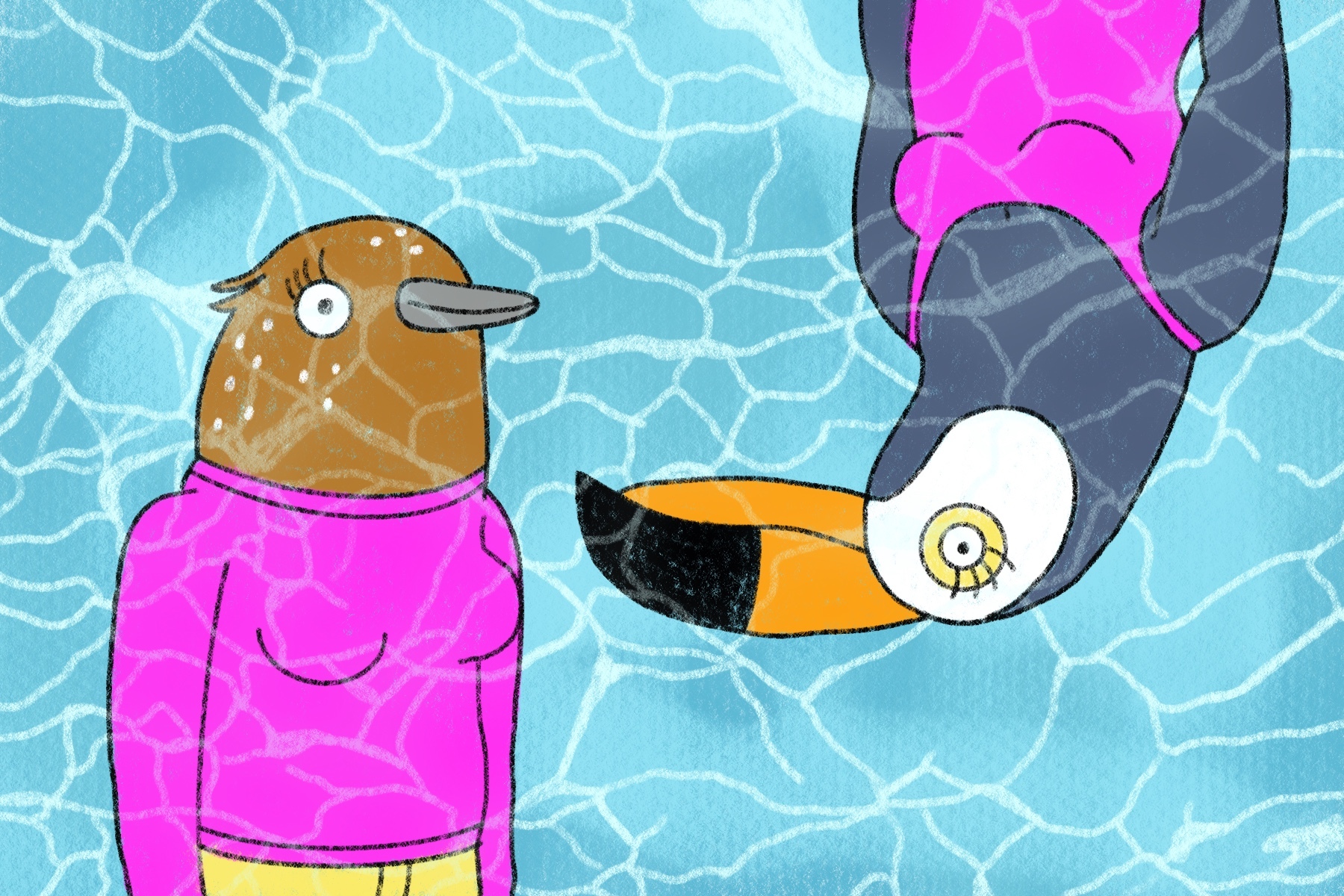Pushing the boundaries of traditional animation and storytelling, “Tuca & Bertie” operates under its own set of rules. Vibrant apartment buildings speak, subways are reimagined as snakes and the two main characters are bird-women who are best friends. In the same vein of fellow animated comedies such as “F is for Family,” “Bob’s Burgers’’ and “Bojack Horseman,”“Tuca & Bertie” is jam-packed with raunchy humor, fantastic characters and heart.
Developed by “Bojack Horseman” producer Lisa Hanawalt, “Tuca & Bertie” follows two bird-women as they navigate the difficult, hilarious and universal perils of adulthood. The wildly bright colors and surreal art style harmoniously complement the candidly human topics the series explores. Cast members Ali Wong, Tiffany Haddish and Steven Yeun use their veteran acting chops to give life to characters much deeper than their quirky animations. Much like “Bojack Horseman,” the series has been critically praised for its respectful, honest portrayal of subject matter that is normally misrepresented or ignored in the media. “Tuca & Bertie” uses its humorous charm and brilliant writing to tactfully approach nuanced themes of sobriety, anxiety and the realities of being a woman.
Sobriety
Like predecessor “Bojack Horseman,” “Tuca & Bertie” seeks to explore important topics while maintaining a humorous charm. This is exemplified through Tuca, a confident, boisterous toucan who is slowly recovering from alcoholism. Despite the usual connotations of the road to sobriety being a somber one, Tiffany Haddish’s energy breathes life and resilience into Tuca. Unlike most television portrayals of recovery, viewers do not watch Tuca suffering with alcoholism. Instead, viewers watch as Tuca learns to readjust to navigating the world without the numbing effect of alcohol.
In an interview with Abraham Riseman of Vulture, Hanawalt discussed why she chose such a unique, but empowering, route for Tuca. She said, “A lot of times, [sobriety] is just a quiet decision. What’s difficult is the social aspect, the anxiety that comes with being in a situation where you’re used to being hammered, and now you’re not and you can’t even have one drink to help lubricate the situation.” Watching Tuca’s trials and tribulations with reacclimating to the world with a sober mind is both humorous and heartbreaking. Above all else, it is a story many can relate to that needs to be told.
Anxiety
To foil Tuca’s flamboyant personality, Hanawalt developed the character of anxious song thrush Bertie. Throughout the series, we watch as Bertie becomes engulfed in outlandish, absurd sequences via different art mediums when she feels anxious; the world around her dramatically shifts into bizarre dreamscapes as Hanawalt cleverly uses animation to tell a story beyond Bertie’s spoken words.
For those who struggle with anxiety, this aspect of Bertie’s character is extremely relatable. Though our worlds may not melt into surreal dreamscapes, anxiety creates a sense of derealization that is typically not portrayed in TV or movies. Despite the daunting nature of these elaborate sequences, Bertie’s anxiety isn’t something meant to make her character seem “flawed.” It is something that makes her and Tuca perfect foils for one another and highlights the theme of female friendship the series is based on.
The Realities of Being a Woman
One of the most empowering aspects of “Tuca & Bertie” is that it features the stories of women written by women. In the show, we learn Bertie has a strong admiration for an acclaimed local baker named Pastry Pete, and she is offered an apprenticeship. Throughout her time working with Pete, he inappropriately pushes Bertie’s boundaries and blatantly abuses his role as her superior and former idol. Viewers can practically feel Bertie’s anxieties rise as she internally deliberates if Pete is being inappropriate with her or if she is just overthinking.
This conflict boils over when Pete hires a young apprentice and repeats the same behavior on her — but with a different outcome. When Bertie attempts to comfort the young girl by half-heartedly explaining, “It’s just part of the job and how he teaches,” the apprentice snaps. In a scene that is poignant but brilliantly subtle, the apprentice asks, “Why are you defending him? And you didn’t warn me?”
This scene captures the struggles women face when dealing with unbalanced power dynamics and the all too frequent dismissal of workplace sexual harassment. Additionally, it also demonstrates the unspoken due diligence women feel to protect one another. In an interview with Jessica Toomer of The Hollywood Reporter, Hanawalt spoke about using adult animation to share stories women can relate to: “I wasn’t consciously thinking, ‘How do I make this more relatable to women?’ I was just writing stories from my own life, stories from my friends’ lives and things that I specifically haven’t seen in adult animation before.”
Despite the well-done portrayal of uniquely female experiences, the show is not specifically geared toward women nor is it a show that seeks to spite men. The male regulars in the show are characters just as valuable as the titular Tuca and Bertie. Steven Yeun voices Bertie’s boyfriend, Speckle, who is incredibly patient with her and serves as a great example of how to be a good partner to someone dealing with trauma. Like Speckle, the man Tuca takes out on her first sober date respects her boundaries and doesn’t make her feel at fault when she is visibly anxious. “Tuca & Bertie” wasn’t written to show malevolence toward men; rather, it provides a refreshing twist on a typically male-focused genre.
Above all else, “Tuca & Bertie” is a show that has something for everyone. The combination of the vivid art style, witty humor and story of an unbreakable friendship truly makes for a wonderful viewing experience. Though the characters are all birds, they each capture true, frank human emotions and experiences. Regardless of what walk of life you come from, “Tuca & Bertie” has a character that will resonate with you.
Garnering praise from high-profile outlets such as Vox, the Huffington Post and Indiewire, “Tuca & Bertie” has earned its spot in the hearts of critics and fans alike. Despite Netflix dropping the show after the first season, Adult Swim will be reviving the series for a second season this summer. Shifting gears from Netflix to Adult Swim, “Tuca & Bertie” will be returning to the screen with a 10-episode season on June 13.
















